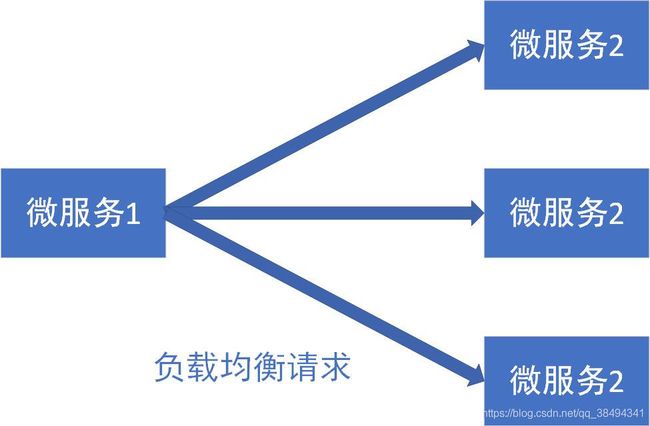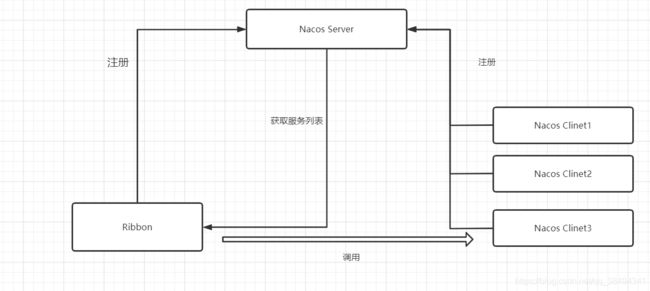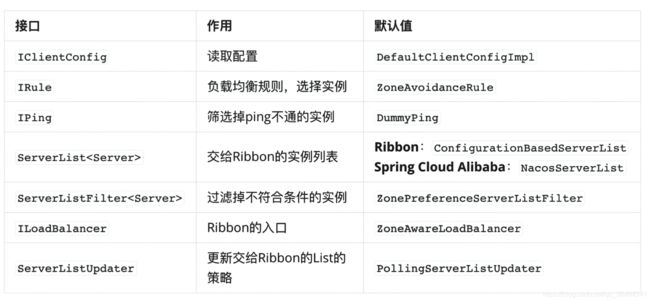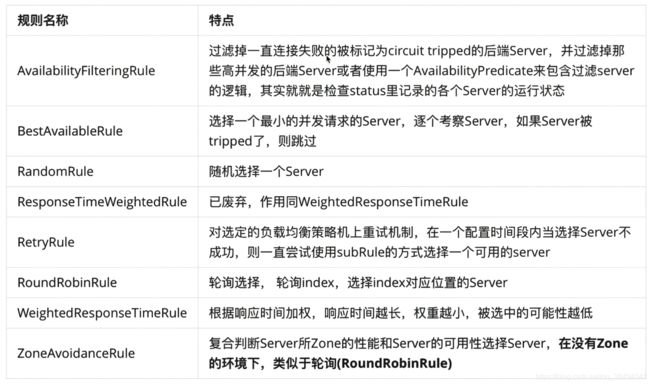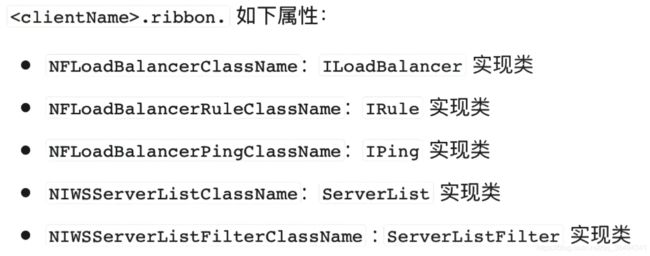SpringCloud Alibaba——Ribbon负载均衡(学习记录)
负载均衡两种方式
服务器端负载均衡
为一个应用部署多个实例,然后由Nginx做反向代理,请求先请求到Nginx上,由Nginx通过负载均衡转发到某个实例。
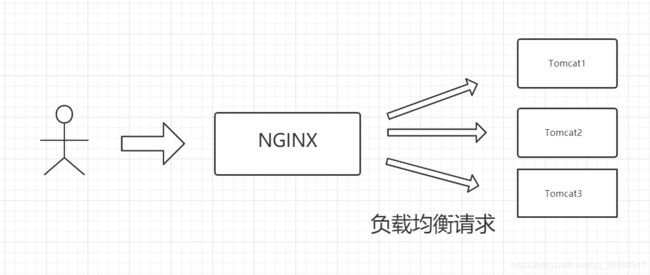
客户端侧负载均衡
内容中心通获取到用户中心的实例,然后自己实现负载均衡算法来请求某个有用户中心的数据,这时候内容中心就是客户端了
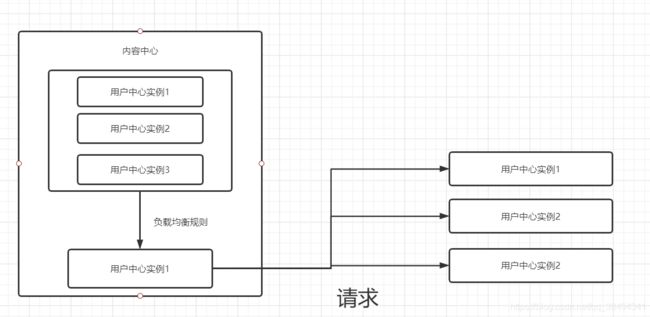
加入了Ribbon之后的架构
整合Ribbon
在Nacos中已经引入了Ribbon,所以不需要再额外引入
需要在RestTemplate中加入注解@LoadBalanced
@Bean
@LoadBalanced
public RestTemplate restTemplate() {
return new RestTemplate();
}
然后可以修改之前的请求代码,ribbon会自动把user-center这个名称从nacos上获取到,并通过负载均衡算法去请求。
UserDTO userDTO = this.restTemplate.getForObject(
"http://user-center/users/{userId}",
UserDTO.class, userId
);
Ribbon的组成
Ribbon 的负载均衡规则
Ribbon的配置
Java代码的方式进行配置
// 这里就是去请求user-center的实例
@Configuration
@RibbonClient(name = "user-center", configuration = RibbonConfiguration.class)
public class UserCenterRibbonConfiguration {
}
@Configuration
public class RibbonConfiguration {
@Bean
public IRule ribbonRule() {
// 实现随机的请求
return new RandomRule();
}
}
这里需要注意,RibbonConfiguration类的包需要在spring启动类的包之外,这是spring的一个bug,扫描到这个包会导致项目启动不来。
这是由于 @Configuration 注解里其实有一个 @Component 注解,在 @SpringBootApplication 注解里有一个 @ComponentScan,他会扫描启动类所在包下的所有 @Component 注解,也就是@Controller,@Service这些。
Spring是一个树状的上下文,@SpringBootApplication扫描的是一个主上下文,Ribbon也会有一个上下文,是一个子上下文,父子上下文扫描重叠就会导致各种问题,父子上下文发生重叠就会导致事务不生效 。
如果将刚刚的配置放到@SpringBootApplication启动类所在包下那么就会将原本细粒度的配置变成了全局的配置(被所有的Ribbon共享),也就是任何的调用都会是采用配置的负载均衡规则。
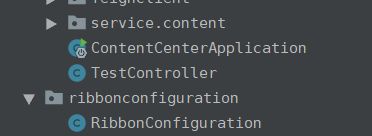
属性配置
user-center:
ribbon:
NFLoadBalancerRuleClassName: com.netflix.loadbalancer.RandomRule
全局配置
@Configuration
@RibbonClients(defaultConfiguration = RibbonConfiguration.class)
public class UserCenterRibbonConfiguration {
}
代码配置VS属性配置
| 配置方式 | 优点 | 缺点 |
|---|---|---|
| 代码配置 | 基于代码,更灵活 | 有坑(父子上下文);线上修改需要打包 |
| 属性配置 | 易上有;配置更加直观,线上无需重新打包;优先级更高 | 极端场景下没有代码配置方式灵活 |
Ribbon支持的配置项
Java代码方式
自己需要什么就可以来挂载Bean
@Bean
public IPing ping() {
return new PingUrl();
}
属性配置
Ribbon饥饿加载
Ribbon默认是懒加载,也就是在第一次访问的时候请求特别慢,因为他要先去创建实例,而之后的速度就很快,这时候想要解决这个问题就可以开启Ribbon饥饿加载,具体配置如下。
ribbon:
eager-load:
enabled: true
clients: user-center #只有在这个配置中的微服务才会只用饥饿加载,多个可以用,分隔
扩展Ribbon,支持Nacos的权重
在Nacos的控制台可以给微服务的实例配置权重,值越大,权重越高,被请求的几率就越大。
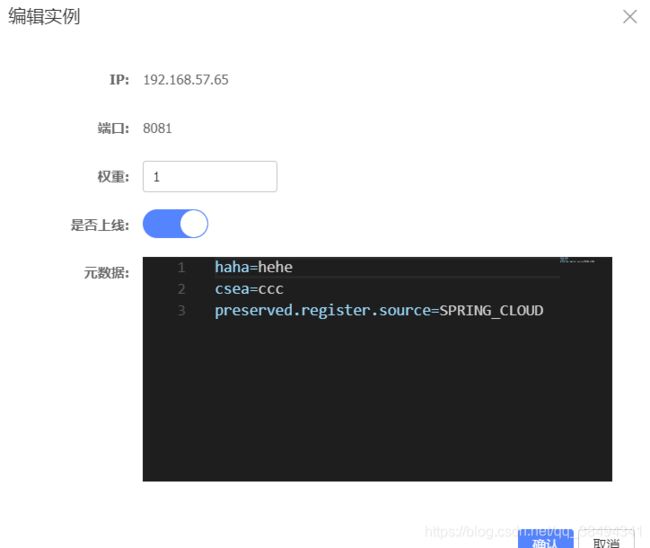
写一个自己的负载均衡规则,来实现权重
@Slf4j
public class NacosWeightedRule extends AbstractLoadBalancerRule {
@Autowired
private NacosDiscoveryProperties nacosDiscoveryProperties;
@Override
public void initWithNiwsConfig(IClientConfig iClientConfig) {
// 读取配置文件,并初始化NacosWeightedRule
}
@Override
public Server choose(Object key) {
try {
BaseLoadBalancer loadBalancer = (BaseLoadBalancer) this.getLoadBalancer();
log.info("lb={}", loadBalancer);
// 想要请求的微服务的名称
String name = loadBalancer.getName();
// 拿到服务发现相关的API
NamingService namingService = nacosDiscoveryProperties.namingServiceInstance();
// nacos client 自动基于权重的负载均衡算法,给我们选择一个实例
Instance instance = namingService.selectOneHealthyInstance(name);
log.info("选择的实例是:port={},instantce={}", instance.getPort(), instance);
return new NacosServer(instance);
} catch (NacosException e) {
e.printStackTrace();
return null;
}
}
}
可以进行属性配置,也可以代码的全局配置,参考上面的Ribbon配置
Ribbon同集群优先
可以使用Nacos的Cluster来实现
手动实现
@Slf4j
public class NacosSameClusterWeightedRule extends AbstractLoadBalancerRule {
@Autowired
private NacosDiscoveryProperties nacosDiscoveryProperties;
@Override
public void initWithNiwsConfig(IClientConfig iClientConfig) {
}
@Override
public Server choose(Object key) {
try {
// 拿到配置文件中的集群名称
String clusterName = nacosDiscoveryProperties.getClusterName();
BaseLoadBalancer loadBalancer = (BaseLoadBalancer) this.getLoadBalancer();
// 想要请求的微服务的名称
String name = loadBalancer.getName();
// 拿到服务器发现相关的API
NamingService namingService = nacosDiscoveryProperties.namingServiceInstance();
// 找到指定服务的所有实例 A
List<Instance> instances = namingService.selectInstances(name, true);
// 过滤出相同集群下的所有实例 B
List<Instance> sameClusterInstances = instances.stream()
.filter(instance -> Objects.equals(instance.getClusterName(), clusterName))
.collect(Collectors.toList());
// 如果B为空,就用A
List<Instance> instancesToBeChosen = new ArrayList<>();
if (CollectionUtils.isEmpty(sameClusterInstances)) {
instancesToBeChosen = instances;
log.warn("发生跨集群的调用,name={},clusterName={},instances={}", name, clusterName, instances);
} else {
instancesToBeChosen = sameClusterInstances;
}
// 基于负载均衡的算法,返回一个实例
Instance instance = ExtendBalancer.getHostByRandomWeight2(instancesToBeChosen);
log.info("选择的实例是:端口={},实例是={}", instance.getPort(), instance);
return new NacosServer(instance);
} catch (NacosException e) {
log.error("发生了异常={}", e);
return null;
}
}
}
/**
* 因为内部方法是 protected,所以可以继承一下调用需要的方法
* 基于Nacos内部的负载均衡方法得到一个实例
*/
class ExtendBalancer extends Balancer {
public static Instance getHostByRandomWeight2(List<Instance> hosts) {
return getHostByRandomWeight(hosts);
}
}
相关配置
微服务B和微服务A的cluster-name都是BJ,那么微服务B调用的接口都是服务器A cluster-name为BJ的程序,如果微服务A cluster-name为BJ的程序挂了,那么就会去调用其他cluster-name的微服务A
spring:
cloud:
nacos:
discovery:
server-addr: localhost:8848
cluster-name: BJ
namespace: 9b74b8d1-94ba-44ea-955b-2e174d42a14a
Ribbon 元数据控制版本
spring:
cloud:
nacos:
discovery:
server-addr: localhost:8848
cluster-name: BJ
namespace: 9b74b8d1-94ba-44ea-955b-2e174d42a14a
metadata:
# 自己这个实例的版本
version: v1
# 允许调用的提供者版本
target-version: v1
优先选择同集群下,符合metadata的实例,如果没有,就选择所有集群下,符合metadata的实例
@Slf4j
public class NacosMetadataClusterRule extends AbstractLoadBalancerRule {
@Autowired
private NacosDiscoveryProperties nacosDiscoveryProperties;
@Override
public void initWithNiwsConfig(IClientConfig iClientConfig) {
}
@Override
public Server choose(Object key) {
try {
// 拿到配置文件中的集群名称 和 调用版本号
String clusterName = this.nacosDiscoveryProperties.getClusterName();
String targetVersion = this.nacosDiscoveryProperties.getMetadata().get("target-version");
// 想要请求的微服务的名称
DynamicServerListLoadBalancer loadBalancer = (DynamicServerListLoadBalancer) getLoadBalancer();
String name = loadBalancer.getName();
// 拿到服务器发现相关的API
NamingService namingService = this.nacosDiscoveryProperties.namingServiceInstance();
// 找到指定服务的所有实例
List<Instance> instances = namingService.selectInstances(name, true);
List<Instance> metadataMatchInstances = instances;
// 如果配置了版本映射,那么只调用元数据匹配的实例
if (StringUtils.isNotBlank(targetVersion)) {
metadataMatchInstances = instances.stream()
.filter(instance -> Objects.equals(targetVersion, instance.getMetadata().get("version")))
.collect(Collectors.toList());
if (CollectionUtils.isEmpty(metadataMatchInstances)) {
log.warn("未找到元数据匹配的目标实例!请检查配置。targetVersion = {}, instance = {}", targetVersion, instances);
return null;
}
}
List<Instance> clusterMetadataMatchInstances = metadataMatchInstances;
// 如果配置了集群名称,需筛选同集群下元数据匹配的实例
if (StringUtils.isNotBlank(clusterName)) {
clusterMetadataMatchInstances = metadataMatchInstances.stream()
.filter(instance -> Objects.equals(clusterName, instance.getClusterName()))
.collect(Collectors.toList());
if (CollectionUtils.isEmpty(clusterMetadataMatchInstances)) {
clusterMetadataMatchInstances = metadataMatchInstances;
log.warn("发生跨集群的调用,clusterName = {}, targetVersion = {}, clusterMetadataMatchInstances = {}", clusterName, targetVersion, clusterMetadataMatchInstances);
}
}
Instance instance = ExtendBalancer.getHostByRandomWeight2(clusterMetadataMatchInstances);
return new NacosServer(instance);
} catch (Exception e) {
log.warn("发生异常", e);
return null;
}
}
}
